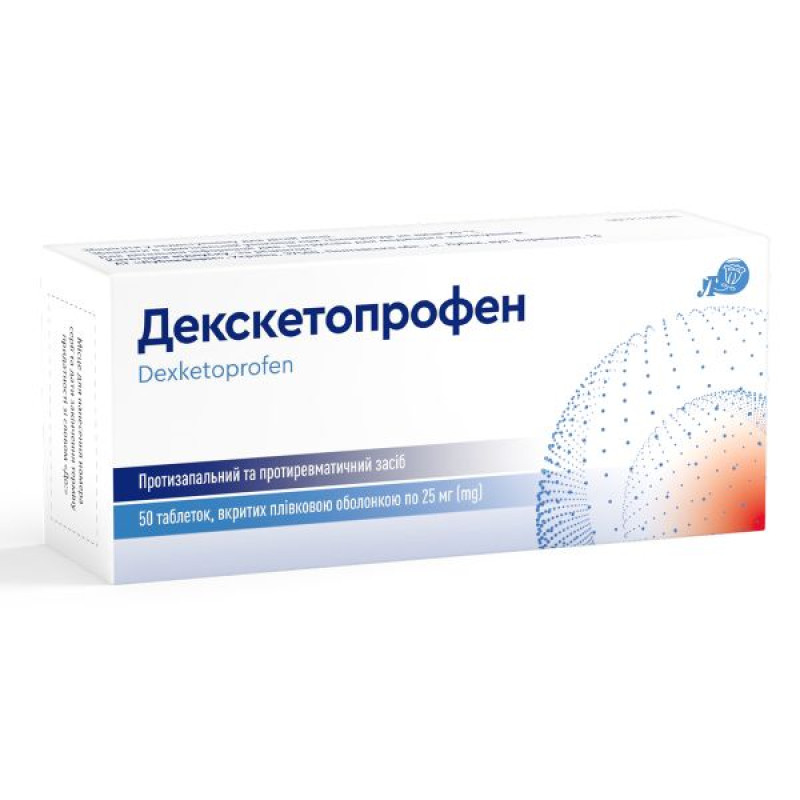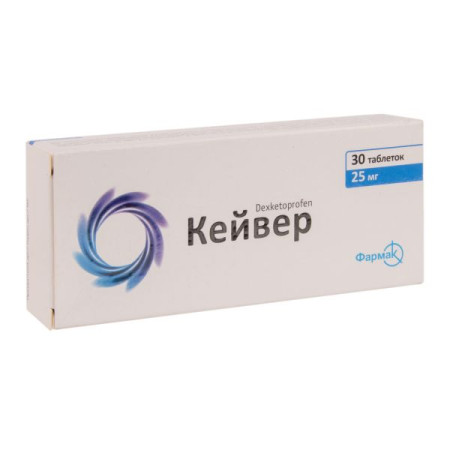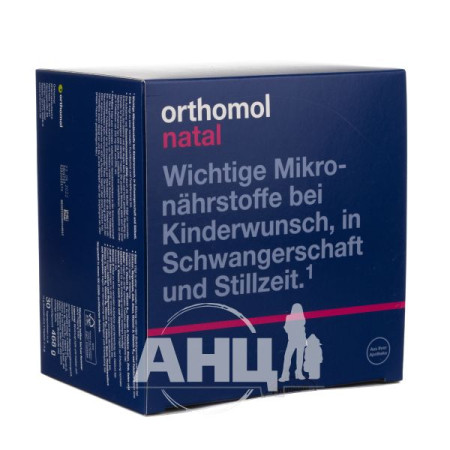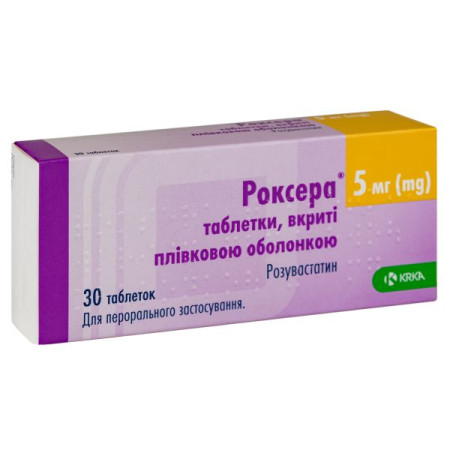Dexketoprofen film-coated tablets 25 mg blister No. 50

Instructions Dexketoprofen film-coated tablets 25 mg blister No. 50
Composition
active ingredient: dexketoprofen;
1 film-coated tablet contains 36.9 mg of dexketoprofen trometamol, equivalent to 25 mg of dexketoprofen;
excipients: microcrystalline cellulose, corn starch, sodium starch glycolate, glycerol distearate;
shell: hypromellose, titanium dioxide (E 171), polyethylene glycol 6000, propylene glycol.
Dosage form
Film-coated tablets.
Main physicochemical properties: round tablets with a biconvex surface, with a score line on one side, covered with a white or almost white film coat.
Pharmacotherapeutic group
Anti-inflammatory and antirheumatic agents. Propionic acid derivatives.
ATX code M01A E17.
Pharmacological properties
Pharmacodynamics
Dexketoprofen trometamol is a propionic acid salt. It is an analgesic, anti-inflammatory and antipyretic drug belonging to the class of non-steroidal anti-inflammatory drugs (NSAIDs).
Mechanism of action.
The mechanism of action is based on a decrease in prostaglandin synthesis by inhibiting cyclooxygenase. In particular, the conversion of arachidonic acid into cyclic endoperoxides PGG2 and PGH2 is inhibited, from which prostaglandins PGE1, PGE2, PGF2a, PGD2 are formed, as well as prostacyclin PGI2 and thromboxanes (TXA2 and TXB2). In addition, inhibition of prostaglandin synthesis may affect other inflammatory mediators, such as kinins, which may also indirectly affect the main effect of the drug.
Pharmacodynamic action.
The inhibitory effect of dexketoprofen on cyclooxygenase-1 and cyclooxygenase-2 activity has been demonstrated in animals and humans.
Clinical efficacy and safety.
Clinical studies have shown that dexketoprofen has an effective analgesic effect, which develops 30 minutes after using the drug and lasts 4–6 hours.
Pharmacokinetics
Absorption.
After oral administration of dexketoprofen trometamol, the maximum plasma concentration (Cmax) is reached after 30 minutes (15–60 minutes).
When dexketoprofen trometamol is administered with food, the AUC values do not change, however the Cmax value decreases and the absorption rate also decreases (tmax increases).
Distribution.
The distribution time and half-life of dexketoprofen trometamol are 0.35 and 1.65 hours, respectively. Due to the high degree of binding to plasma proteins (99%), the average volume of distribution of dexketoprofen trometamol is less than 0.25 l/kg. A multiple-dose pharmacokinetic study showed that after the last administration of dexketoprofen trometamol, the area under the bioavailability curve (AUC) was not higher than after its single administration, which proves the absence of cumulation (accumulation) of the drug.
Biotransformation and excretion.
After the use of dexketoprofen trometamol, only the S-(+)-enantiomer is detected in the urine, which proves the absence of its inversion into the R-(-)-enantiomer in the human body.
Dexketoprofen is eliminated mainly by glucuronidation and subsequent renal excretion.
Indication
Symptomatic treatment of mild to moderate pain, e.g. musculoskeletal pain, painful menstruation (dysmenorrhea), toothache.
Contraindication
- Hypersensitivity to the active substance or to any other non-steroidal anti-inflammatory drug (NSAID) or to any of the excipients.
- Use in patients in whom substances with a similar mechanism of action, such as acetylsalicylic acid and other NSAIDs, cause attacks of bronchial asthma, bronchospasm, acute rhinitis or lead to the development of nasal polyps, urticaria or angioedema.
- Photoallergic or phototoxic reactions are known during treatment with ketoprofen or fibrates.
- History of gastrointestinal bleeding or perforation associated with NSAID use.
- Active phase of peptic ulcer/gastrointestinal bleeding, history of recurrent peptic ulcer/gastrointestinal bleeding.
- Chronic dyspepsia.
- Bleeding in the active phase or increased bleeding.
- Crohn's disease or nonspecific ulcerative colitis.
- Severe heart failure.
- Moderate or severe renal impairment (creatinine clearance ≤ 59 ml/min).
- Severe liver dysfunction (10–15 points on the Child–Pugh scale).
- Hemorrhagic diathesis or other blood clotting disorders.
- Severe dehydration (due to vomiting, diarrhea, or insufficient fluid intake).
- 3rd trimester of pregnancy and breastfeeding (see "Use during pregnancy or breastfeeding").
Interaction with other medicinal products and other types of interactions
The following drug interactions generally characterize the NSAID class of drugs.
Unwanted combinations
- Anticoagulants: NSAIDs enhance the effect of anticoagulants, such as warfarin, due to the high degree of binding of dexketoprofen to blood plasma proteins, as well as due to inhibition of platelet function and damage to the gastric and duodenal mucosa. If concomitant use is necessary, it should be carried out under medical supervision and with careful monitoring of relevant laboratory parameters.
- Heparin: increased risk of bleeding (due to inhibition of platelet function and damage to the gastric and duodenal mucosa). If concomitant use is necessary, it should be carried out under medical supervision and with careful monitoring of relevant laboratory parameters.
- Corticosteroids: increased risk of peptic ulcers and gastrointestinal bleeding.
- Lithium preparations (reported with several NSAIDs): NSAIDs increase blood lithium levels to toxic levels by reducing renal excretion. Therefore, blood lithium levels should be monitored when initiating dexketoprofen, adjusting the dose, or discontinuing the drug.
- Methotrexate when used in high doses (from 15 mg/week): the level of methotrexate in the blood increases due to a decrease in its excretion by the kidneys, which leads to toxic effects on the blood system.
- Hydantoin derivatives and sulfonamides: possible increase in the toxicity of these substances.
Combinations requiring caution
- Diuretics, ACE inhibitors, aminoglycoside antibiotics and angiotensin II receptor antagonists. Dexketoprofen weakens the effect of diuretics and other antihypertensive agents. In some patients with impaired renal function (for example, in case of dehydration or in elderly patients with impaired renal function), their condition may worsen when cyclooxygenase inhibitors are used simultaneously with ACE inhibitors, angiotensin II receptor antagonists and aminoglycoside antibiotics. As a rule, this deterioration is reversible. When using dexketoprofen simultaneously with any diuretic, it is necessary to ensure that the patient is not hydrated, and during treatment, renal function should be monitored.
- Methotrexate when used in low doses (less than 15 mg/week): possible increase in toxic effects on the blood system due to reduced renal excretion; if necessary, weekly monitoring of the blood picture is necessary, especially in the presence of even a slight decrease in renal function, as well as in elderly patients.
- Pentoxifylline: the risk of bleeding increases, so it is necessary to monitor the patient and control the bleeding time.
- Zidovudine: there is a risk of increased toxicity of zidovudine on erythropoiesis (toxicity of reticulocytes) up to the development of severe anemia a week after the use of NSAIDs, therefore, in the first 1–2 weeks after the start of NSAID therapy, blood tests with reticulocyte counts should be monitored.
- Sulfonylurea derivatives: NSAIDs may enhance the hypoglycemic effect of sulfonylurea drugs by displacing them from blood protein binding.
Combinations to consider when used with Dexketoprofen
- Beta-blockers: their antihypertensive effect may be reduced due to inhibition of prostaglandin synthesis.
- Cyclosporine and tacrolimus: increased renal toxicity of these drugs due to the effect of NSAIDs on prostaglandin synthesis; when using this combination, regular monitoring of renal function is necessary.
- Thrombolytic drugs: increased risk of bleeding.
- Platelet aggregation inhibitors and selective serotonin reuptake inhibitors (SSRIs): increased risk of gastrointestinal bleeding.
- Probenecid: increased plasma concentrations of dexketoprofen due to decreased renal tubular secretion and glucuronidation; in this case, dose adjustment of dexketoprofen is required.
- Cardiac glycosides: their concentration in blood plasma may increase.
- Mifepristone: There is a theoretical risk that prostaglandin synthesis inhibitors may alter the efficacy of mifepristone. Limited data suggest that concomitant use of NSAIDs and prostaglandins does not affect the effects of mifepristone or prostaglandins, namely cervical ripening or uterine contractility, and does not reduce the clinical efficacy of medical abortion.
- Quinoline antibiotics: Animal studies have shown that the use of high doses of quinoline antibiotics in combination with NSAIDs increases the risk of seizures.
- Tenofovir: concomitant use with NSAIDs may increase blood urea nitrogen and creatinine levels in the blood plasma, therefore renal function should be monitored to control for potential synergistic effects on their function.
- Deferasirox: concomitant use with NSAIDs may increase gastrointestinal toxicity and requires careful clinical monitoring.
- Pemetrexed: Concomitant use with NSAIDs may reduce the elimination of pemetrexed, therefore caution should be exercised when administering higher doses of NSAIDs. Patients with mild to moderate renal impairment (creatinine clearance 45 to 79 ml/min) should avoid NSAIDs for 2 days before and 2 days after pemetrexed administration.
Application features
Dexketoprofen should be used with caution in patients with a history of allergic reactions.
Concomitant use of the drug with other NSAIDs, including selective cyclooxygenase-2 inhibitors, should be avoided. Undesirable effects of the drug can be minimized by using the lowest effective dose for the shortest possible time necessary to relieve symptoms.
Gastrointestinal safety
When using NSAIDs, peptic ulcers with or without perforation and bleeding (even fatal) may develop in the digestive tract. These undesirable effects can occur at any time during treatment, with or without warning symptoms, and are independent of a history of serious digestive disorders. If gastrointestinal bleeding or peptic ulcer develops during the use of dexketoprofen, therapy with the drug should be discontinued immediately.
The risk of developing the above-mentioned undesirable effects increases in proportion to the increase in the dose of NSAIDs, as well as in patients with a history of gastric or duodenal ulcer and in the elderly. During the use of the drug, the doctor should carefully monitor the condition of patients, taking into account the possible occurrence of gastrointestinal bleeding. Before starting the use of dexketoprofen trometamol and in the presence of a history of esophagitis, gastritis and/or peptic ulcer disease, it is necessary, as in the case of the use of other NSAIDs, to make sure that these diseases are in remission. For patients with existing symptoms of digestive tract pathology and with a history of digestive tract diseases, it is necessary to monitor for the occurrence of digestive tract disorders, especially bleeding in the digestive tract.
NSAIDs should be prescribed with caution to patients with a history of gastrointestinal diseases (ulcerative colitis, Crohn's disease), as there is a risk of their exacerbation.
To reduce the risk of undesirable side effects from the digestive tract, the doctor may prescribe drugs that have a protective effect on the digestive tract mucosa (misoprostol, proton pump inhibitors). This also applies to patients who require concomitant administration of low doses of acetylsalicylic acid or other drugs that increase the risk of digestive system complications.
Patients should be informed that they should report any abdominal discomfort (primarily gastrointestinal bleeding), especially at the beginning of treatment, to their doctor.
Kidney safety
Patients with impaired renal function should be prescribed the drug with caution, since the use of NSAIDs may worsen renal function, fluid retention and edema. Due to the increased risk of nephrotoxicity, the drug should be prescribed with caution in patients receiving diuretics, as well as in patients who may develop hypovolemia. During treatment, the patient should receive sufficient fluid to avoid dehydration, which can lead to increased toxic effects on the kidneys.
Like all NSAIDs, the drug can increase the concentration of urea nitrogen and creatinine in the blood plasma. Like other prostaglandin synthesis inhibitors, its use may be accompanied by adverse reactions from the kidneys, leading to glomerulonephritis, interstitial nephritis, papillary necrosis, nephrotic syndrome and acute renal failure. Most renal dysfunction occurs in elderly patients.
Liver safety
The drug should be prescribed with caution to patients with impaired liver function. Like other NSAIDs, the drug may cause a temporary and slight increase in some liver parameters, as well as a pronounced increase in the activity of AST and ALT. If these parameters increase, therapy should be discontinued.
Most liver dysfunction occurs in elderly patients.
Safety regarding the cardiovascular system and cerebral circulation
All non-selective NSAIDs can reduce platelet aggregation and increase bleeding time by inhibiting prostaglandin synthesis. Therefore, it is not recommended to prescribe dexketoprofen trometamol to patients taking drugs that affect hemostasis, such as warfarin, other coumarins or heparins. The greatest number of cardiovascular system disorders occurs in elderly patients.
Skin reactions
Very rare cases of serious skin reactions (some fatal) have been reported with NSAIDs, including exfoliative dermatitis, Stevens-Johnson syndrome and toxic epidermal necrolysis. The risk of these events is likely to be greatest at the start of treatment, with most patients experiencing them within the first month of treatment.
At the first signs of skin rashes, mucosal lesions, or other symptoms of hypersensitivity, Dexketoprofen should be discontinued.
Other information
Particular caution should be exercised when prescribing the drug to patients:
- with hereditary disorders of porphyrin metabolism (for example, with acute intermittent porphyria);
- with dehydration;
- immediately after major surgical interventions.
If the doctor considers that long-term use of dexketoprofen is necessary, liver and kidney function should be monitored regularly.
In very rare cases, severe acute hypersensitivity reactions (e.g. anaphylactic shock) have been observed. At the first signs of severe hypersensitivity reactions after taking Dexketoprofen, treatment should be discontinued. Depending on the symptoms, the treatment required in such cases should be carried out under the supervision of a doctor.
Patients with asthma in combination with chronic rhinitis, chronic sinusitis and/or nasal polyps are at higher risk of developing allergy to acetylsalicylic acid and/or NSAIDs than other patients. The administration of this drug may cause asthma attacks or bronchospasm, especially in patients with allergy to acetylsalicylic acid or NSAIDs.
In special cases, severe infectious complications of the skin and soft tissues may develop in the setting of chickenpox. Currently, there is no data that allows us to completely exclude the role of NSAIDs in the exacerbation of this infectious process. Therefore, the use of Dexketoprofen should be avoided in chickenpox.
Dexketoprofen should be used with caution in patients with hematopoietic disorders, systemic lupus erythematosus, and mixed connective tissue diseases.
Like other NSAIDs, dexketoprofen can mask the symptoms of infectious diseases.
Masking the symptoms of underlying infections
Dexketoprofen may mask the symptoms of an infectious disease, which may delay the initiation of appropriate treatment and thereby complicate the course of the disease. This has been observed in bacterial community-acquired pneumonia and bacterial complications of varicella. If dexketoprofen is used for fever or for pain relief in an infection, monitoring for the infectious disease is recommended. In outpatient settings, the patient should consult a doctor if symptoms persist or worsen.
Use during pregnancy or breastfeeding
Dexketoprofen is contraindicated in the third trimester of pregnancy and during breastfeeding.
Pregnancy.
Inhibition of prostaglandin synthesis may adversely affect pregnancy and/or fetal development. According to the results of epidemiological studies, the use of drugs that inhibit prostaglandin synthesis in early pregnancy increases the risk of miscarriage, fetal heart defects and non-union of the anterior abdominal wall. Thus, the absolute risk of developing cardiovascular anomalies increased from Starting from the 20th week of pregnancy, the use of dexketoprofen may cause oligohydramnios due to fetal renal dysfunction. This pathology may occur in the near future after the start of treatment and is usually reversible after discontinuation of treatment. The appointment of dexketoprofen in the I and II trimesters of pregnancy is possible only in case of extreme necessity. When prescribing dexketoprofen to women planning a pregnancy or in the I and II trimesters of pregnancy, the lowest possible effective dose should be used for the shortest possible duration of treatment. Antenatal monitoring for oligohydramnios should be considered after administration of dexketoprofen for several days, starting from the 20th week of pregnancy. Dexketoprofen should be discontinued if oligohydramnios is detected.
During the third trimester, all prostaglandin synthesis inhibitors cause:
Risks to the fetus:
- cardiovascular toxicity, such as premature closure of the ductus arteriosus and hypertension in the pulmonary artery system;
- renal dysfunction, which may progress to renal failure with the development of oligohydramnios (see above).
Risks for the woman at the end of pregnancy and for the newborn:
- increased bleeding time due to inhibition of platelet aggregation, even when using the drug in low doses;
- suppression of uterine contractile activity, which leads to prolongation and delay of labor.
There is no data on the penetration of dexketoprofen into breast milk. Dexketoprofen is contraindicated during breastfeeding.
Fertility.
As with all NSAIDs, dexketoprofen trometamol may impair female fertility and is therefore not recommended in women attempting to conceive. Women who have difficulty conceiving or are undergoing investigation of infertility should consider discontinuing the drug.
If dexketoprofen is used by a woman attempting to conceive, or during the first and second trimesters of pregnancy, the lowest effective dose should be used for the shortest possible duration.
Ability to influence reaction speed when driving vehicles or other mechanisms
When using Dexketoprofen tablets, undesirable effects such as dizziness, visual disturbances or drowsiness may occur, which reduces the speed of reaction, the ability to drive vehicles and work with other mechanisms.
Method of administration and doses
Dosage.
Adults.
Depending on the type and intensity of pain, the recommended dose is 12.5 mg (½ film-coated tablet) every 4–6 hours or 25 mg (1 film-coated tablet) every 8 hours. The daily dose should not exceed 75 mg.
Undesirable effects of the drug can be minimized by using the lowest effective dose for the shortest possible time necessary to eliminate symptoms (see section "Special instructions for use"). Dexketoprofen is not intended for long-term therapy; treatment continues as long as symptoms persist.
Elderly patients. It is recommended to start treatment with low doses. The daily dose is 50 mg. If the drug is well tolerated, the dose can be increased to the usual dose.
In case of impaired liver function. In patients with mild to moderate liver dysfunction, treatment should be started with the minimum recommended dose and under strict medical supervision. The daily dose is 50 mg. Dexketoprofen tablets are contraindicated in patients with severe liver dysfunction.
Renal impairment: In patients with mild renal impairment (creatinine clearance 60–89 ml/min), the initial total daily dose should be reduced to 50 mg.
Dexketoprofen tablets are contraindicated in patients with moderate or severe renal impairment (creatinine clearance ≤ 59 ml/min).
Method of administration and doses:
It is recommended to take the tablets with a sufficient amount of liquid (e.g. a glass of water). Simultaneous administration with food slows down the absorption of the drug (see the "Pharmacokinetics" section), therefore, in case of acute pain, it is recommended to take the drug at least 30 minutes before a meal.
Children.
The use of Dexketoprofen in children has not been studied, therefore safety and efficacy in children and adolescents have not been established, the drug should not be prescribed to children and adolescents.
Overdose
Symptoms of overdose are unknown. Similar drugs cause disorders of the digestive tract (vomiting, anorexia, abdominal pain) and the nervous system (drowsiness, vertigo, disorientation, headache).
In case of accidental overdose, symptomatic therapy should be initiated immediately according to the patient's clinical condition. If an adult or child has taken a dose of more than 5 mg/kg body weight, activated charcoal should be administered within 1 hour. Hemodialysis may be used to remove dexketoprofen.
Adverse reactions
The table below lists adverse reactions whose relationship to dexketoprofen trometamol, based on clinical data, is considered to be minimally possible, as well as adverse reactions reported during the post-marketing period.
| Organ system | Often (³1/100, | Sometimes (³1/1000, | Rarely (³1/10000, | Very rare ( |
| Blood and lymphatic system disorders | _ | _ | _ | Neutropenia, thrombocytopenia |
| On the part of the immune system | _ | _ | Swelling of the larynx | Anaphylactic reactions, including anaphylactic shock |
| Metabolic | _ | _ | Anorexia | _ |
| From the psyche | _ | Insomnia, anxiety | _ | |
From the side nervous system | _ | Headache, dizziness, drowsiness | Paresthesias, syncope | _ |
| From the organs of vision | _ | _ | _ | Blurred vision |
| Hearing and vestibular disorders | _ | Vertigo | _ | Tinnitus |
| From the heart | _ | Palpitation | _ | Tachycardia |
| From the vascular system | _ | Tides | Arterial hypertension | Arterial hypotension |
| Respiratory system | _ | _ | Bradypnea | Bronchospasm, dyspnea |
| From the digestive tract | Nausea and/or vomiting, abdominal pain, diarrhea, dyspepsia | Gastritis, constipation, dry mouth, flatulence | Peptic ulcer disease, ulcer bleeding or perforation | Pancreatitis |
| Liver | _ | _ | Hepatocellular damage | _ | Skin and subcutaneous tissue disorders | _ | Rash | Hives, acne, increased sweating | Syndrome Stevens-Johnson syndrome, toxic epidermal necrolysis (Lyell's syndrome), facial angioedema, photosensitivity, itching |
| Musculoskeletal system | _ | _ | Back pain | _ |
| From the urinary system | _ | _ | Acute renal failure, polyuria | Jade or nephrotic syndrome |
| From the reproductive system | _ | _ | Menstrual cycle disorders, prostate dysfunction | _ |
| General violations | _ | Fatigue, pain, asthenia, muscle rigidity, malaise | Peripheral edema | _ |
| Laboratory indicators | _ | _ | Abnormal liver function tests | _ |
From the digestive tract: most often, adverse reactions are observed from the digestive tract. Thus, the development of peptic ulcer, perforation or bleeding in the digestive tract is possible, sometimes with a fatal outcome, especially in elderly patients. According to available data, nausea, vomiting, diarrhea, flatulence, constipation, dyspepsia, abdominal pain, melena, vomiting with blood, ulcerative stomatitis, exacerbation of colitis, Crohn's disease are possible against the background of the drug. Gastritis is observed less often. Also, edema, arterial hypertension, heart failure may develop against the background of the use of NSAIDs.
As with other NSAIDs, aseptic meningitis may develop, which mainly occurs in patients with systemic lupus erythematosus or mixed collagen disease, and blood reactions (purpura, hypoplastic and hemolytic anemia, rarely - agranulocytosis and bone marrow hypoplasia).
Bullous reactions, including Stevens-Johnson syndrome and toxic epidermal necrolysis (very rare), are possible.
According to clinical trial results and epidemiological data, the use of some NSAIDs, especially in high doses and for long periods, may be associated with a slightly increased risk of developing pathologies caused by arterial thrombosis (for example, myocardial infarction or stroke).
Reporting of suspected adverse reactions.
Reporting adverse reactions after the registration of a medicinal product is important. This allows monitoring of the benefit/risk ratio when using this medicinal product. Medical and pharmaceutical professionals, as well as patients or their legal representatives, should report all cases of suspected adverse reactions and lack of efficacy of the medicinal product via the Automated Information System for Pharmacovigilance at the link: https://aisf.dec.gov.ua.
Expiration date
2 years.
Do not use the drug after the expiration date indicated on the package!
Storage conditions
In the original packaging at a temperature not exceeding 25 °C.
Keep out of reach of children.
Packaging
10 film-coated tablets in blisters.
10 film-coated tablets in a blister; 1, 3, 5 or 10 blisters in a pack.
Vacation category
According to the recipe.
Producer
JSC "Lubnypharm".
Location of the manufacturer and address of its place of business
Ukraine, 37500, Poltava region, Lubny, Barvinkova st., 16.
There are no reviews for this product.
There are no reviews for this product, be the first to leave your review.
No questions about this product, be the first and ask your question.










